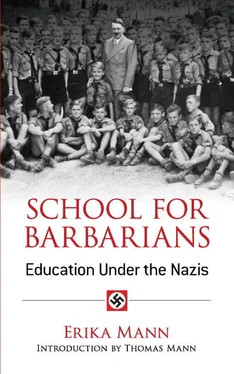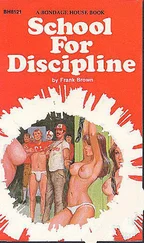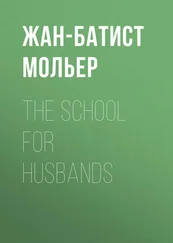“Our only purpose,” they say, “our only aim. The gospel,” they assert. Nothing could be less complicated.
Of course, at the beginning, while the regime was still expecting an opposition (which never materialized), it must have been difficult to combine the “New Gospel” with the lessons in Christian faith which had been hastily prepared for school use. Edicts, then, were ambiguous and complex, lacking the admirable directness of Mutschmann or Ley today.
The edicts addressed to teachers of religion may be summarized: Both faiths, National Socialism and Christianity, draw their strength from the God of the Universe. Teachers must remember that they have to do away with differences of opinion, and emphasize the German experience of God. The Old Testament must be carefully expurgated. Only those portions of it which treat of biological questions or are necessary for the understanding of the New Testament are to be used. For, as a whole, the Old Testament mirrors the Jewish spirit, and tells of the downfall of a people having nothing to do with godly matters.
This official description of the Bible is a gentle one. At mass meetings other opinions appear: Gau-Obermann Krause described the Old Testament in the Sport Palace in Berlin as a “book for cattle-drivers and procurers”; and he was never reprimanded.
Officially, the Nazis demand the recognition of Jesus. But they convert him into a hero without fear, a Siegfried of Nordic stamp who waged war on the Jews until he was killed by them. Side by side with the gentler words intended for export, there are any number of Krause-like comments. The Fountain, in the Jan. 2, 1934, issue, declares: “How high Horst Wessel towers over that Jesus of Nazareth! That Jesus who pleaded that the bitter cup be taken from him! How unattainably high all Horst Wessels stand above this Jesus!”
It must be repeated that nothing can be said in Germany without official sanction. Thus, the words of journalists are, in their way, as “official” as government statements. Journalists write what Ministers think; but the Ministers are careful.
In the schools, too, the Ministers have helpers, with “Lines of Direction” and “Plans for Education,” which enlighten the populace as the Ministers desire. One group of Hanover teachers published a three-part curriculum for religious instruction.
1. God and Nature:
Christian tradition and its explanation. The mechanical-materialistic concept of the world and its end-products, namely, Liberalism and Marxism [in France, Germany, Russia]. The modern scientific concept of the world and its religious meaning. Biology and Christianity.
2. Religion and Race:
a. Hebraism and Christianity.
b. Roman Christianity from the Council of Trent to the present time.
c. Islam, Buddhism.
d. The German Faith Movement.
3. Christianity and the Germanic Weltanschauung:
Germanic faith in God and the Christian mission. The Savior. The ideals of monks and knights in the Middle Ages. Parsifal, Ekkehard. Luther [here the addition of suitable letters from Paul]. Arndt [a militarist playwright] and Schleiermacher [a philosopher whose place here is arbitrary] with retrospective accounts of Pietism and Idealism. Statesmen and soldiers: Bismarck, Hindenburg, W. Flex. Christianity and National Socialism. Struggles for a National Church in past history and in the present.
It would be superfluous to remark that the whole curriculum is an insult to the Christian religion, “Biology and Christianity” — it is difficult to find two other such remote concepts, anywhere. And “Hindenburg and Walter Flex” — a general and a writer on military subjects, in the religion course! Yet these gentlemen find room in their curriculum for “race,” “the ideal of knighthood,” “Arndt” — whatever pleases the Nazi leaders is taught. German children learn that Hitler is pious and reverent; this is one of the things they must believe — it cannot be proved. After the blood bath of June 30, 1934, they were informed that the Führer had piously and reverently retired to the solitude of his little house in Berchtesgaden, near Munich. He was visited there by a little old woman, who asked him how he hoped to accomplish his mission, and how he had come to arrange the blood bath. “Silently the Führer pulled a volume from his pocket… it was the New Testament.”
There is a “Twenty Questions” game in Religion, as there is in Geo-politics, and with the same purpose.
“Who, children, is it in these days who most reminds us of Jesus — through his love of humble people and his readiness for self-sacrifice?”
And the answer is: “The Führer.”
“Who most reminds us of the disciples, because of their loyal attachment to the Führer?”
“General Goering, Dr. Goebbels, and (before the blood-bath) Captain Roehm.”
One teacher went further. The pupils in the Public School in Wanne, Queen Louise’s School, had to copy this “Credo” from the blackboard: “I believe in Germany, God’s other beloved Son, Master of His own Self, conceived under the Nordic Heavens, born between the Alps and the Sea, suffered under Papists and Mammonists, calumniated, beaten, and thrust into misery, tempted into Hell by Devils of all sorts after decades of poverty and affliction, arisen again from the national Death into Ekkehardt’s, Bach’s and Goethe’s world of the Spirit, where He sitteth at the side of His brother of Nazareth, at the right hand of God the Father Almighty, from whence he shall come to judge the quick and the dead.”
The writer of that lunatic passage is named Deppe. It was quoted in the General Evangelical-Lutheran Church Newspaper on May 14, 1937.
There are slogans provided for German youth. The children must learn one a week, and recite it each day of that week. “Judas, the Jew, betrayed Jesus, the German, to the Jews.” What impressive madness! And no one can distinguish the religious slogans from the National Socialist ones:
Versailles ist Lüge, Schmach und Schand,
Versailles ist Dein Tod, O Vaterland, —
Du bist ein deutsches Kind, so denke dran,
Was Dir der Feind in Versailles angetan!
Versailles was a lie, a shame, a brand,
Versailles was your death, O Fatherland,—
You are a German child, so think thereon,
What at Versailles your enemies have done!
“But the Fatherland sitteth on the Right Hand of God the Father Almighty….” Is it National Socialism or is it religion?
It is both; it has to be. The words and concepts are synonymous and interchangeable. At morning chapel, the platform is decorated with the swastika. Hitler’s photograph hangs under the crucifix. Choirs of children sing the heroic deeds of the Nazis: the glorious explosion of a bridge by Leo Schlageter; the death of Horst Wessel. Even such Christian festivals as confirmation are utilized. “Just after dark,” a report begins, “the school was lined up on the parade ground with lit torches; a central flame was kindled, and the boys to be confirmed were admitted into the first hundred, or upper school. The headmaster made an address in which he stressed their new obligations in pursuing those personal ideals of Honor, Cleanliness, and Courage, which their country demanded. He then presented each boy with a side-arm, which his new status in the first hundred requires him to wear, and with a text. These texts closely resembled the ‘Graces’ said occasionally before meals; for example: ‘One does not beg for justice, one must fight for justice.’”
Pagan festivals, too, are given the same rank and importance, and are celebrated everywhere. The Sonnenwendfeiern (solstice festivals) are in particular favor. Participants leap the bonfires, swearing eternal faithfulness to National Socialism, which “continues in its course like the sun.” And the Nazis rejoice over the “lovely custom.” Political Education, the organ of the Saxon N.S. Teachers’ Union, writes: “What has suffered most in the course of the last thousand years of our history has been the connection with the religious treasure of our ancestors, which, however, could not be entirely done away with. That is easy to understand — in spite of the methods of force used in Christianizing our ancestors — which resulted in the conscious and stubborn derogation of the so-called heathen worship of idols, the memories of whose festivals, however, could not be entirely obliterated from the memory of the people….”
Читать дальше












